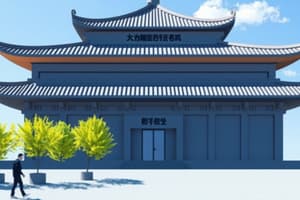Podcast
Questions and Answers
According to Gumede (2008), what is the primary purpose of public policy?
According to Gumede (2008), what is the primary purpose of public policy?
- To address and solve pressing national problems. (correct)
- To regulate behavior and maintain order.
- To provide a framework for long-term strategic planning.
- To establish legal rules and regulations.
Public policy in South Africa should primarily focus on environmental conservation rather than social transformation and economic growth.
Public policy in South Africa should primarily focus on environmental conservation rather than social transformation and economic growth.
False (B)
What is the main difference between a policy and a law?
What is the main difference between a policy and a law?
A policy is a guiding framework, while a law is a system of enforceable rules.
The National Development Plan (NDP) 2030 is a __________ strategy addressing poverty, inequality, and promoting inclusive economic growth.
The National Development Plan (NDP) 2030 is a __________ strategy addressing poverty, inequality, and promoting inclusive economic growth.
Match the stage of the policy-making process with its description:
Match the stage of the policy-making process with its description:
Which of the following is a key characteristic of public policy?
Which of the following is a key characteristic of public policy?
According to the content provided, governments are always forced to adopt SDGs.
According to the content provided, governments are always forced to adopt SDGs.
What is Izimbizo in the context of South African public participation?
What is Izimbizo in the context of South African public participation?
A Weberian bureaucratic state is characterized by a clear __________ structure and strict rules.
A Weberian bureaucratic state is characterized by a clear __________ structure and strict rules.
What distinguishes a postmodern state from a Weberian bureaucratic state?
What distinguishes a postmodern state from a Weberian bureaucratic state?
Policy is solely defined by what the government chooses to act upon.
Policy is solely defined by what the government chooses to act upon.
Explain the 'do nothing' approach in public health, as described in the content.
Explain the 'do nothing' approach in public health, as described in the content.
According to Marxist theory, how is power distributed in the policy process?
According to Marxist theory, how is power distributed in the policy process?
__________ theory suggests that elite groups hold the majority of power, shaping policies to serve their interests.
__________ theory suggests that elite groups hold the majority of power, shaping policies to serve their interests.
According to the content, South Africa lacks active public participation in its democracy.
According to the content, South Africa lacks active public participation in its democracy.
What did the Zondo Commission reveal about power, secrecy, and policy making in South Africa?
What did the Zondo Commission reveal about power, secrecy, and policy making in South Africa?
What is a key challenge for researchers analyzing policy-making in South Africa?
What is a key challenge for researchers analyzing policy-making in South Africa?
Why is an interdisciplinary approach important for policy analysis in South Africa?
Why is an interdisciplinary approach important for policy analysis in South Africa?
The debate over __________ of state assets often pits neoliberal economic arguments against those emphasizing state control and public welfare.
The debate over __________ of state assets often pits neoliberal economic arguments against those emphasizing state control and public welfare.
Match the term related to policy analysis with the correct description:
Match the term related to policy analysis with the correct description:
Flashcards
Public Policy
Public Policy
Decisions and actions taken by the government.
Policy
Policy
A guiding framework developed by governments to achieve specific goals.
Legislation
Legislation
Laws passed by a parliament.
Law
Law
Signup and view all the flashcards
Public Policy Characteristics: Addresses public issues
Public Policy Characteristics: Addresses public issues
Signup and view all the flashcards
Public Policy Characteristics: Goal oriented
Public Policy Characteristics: Goal oriented
Signup and view all the flashcards
Public Policy Characteristics: Dynamic and evolving
Public Policy Characteristics: Dynamic and evolving
Signup and view all the flashcards
Public Policy Characteristics: Public Welfare
Public Policy Characteristics: Public Welfare
Signup and view all the flashcards
Green Paper
Green Paper
Signup and view all the flashcards
White Paper
White Paper
Signup and view all the flashcards
Bill Preparation
Bill Preparation
Signup and view all the flashcards
Public Participation
Public Participation
Signup and view all the flashcards
Weberian Bureaucratic State
Weberian Bureaucratic State
Signup and view all the flashcards
Postmodern State
Postmodern State
Signup and view all the flashcards
Marxist Theory, Policy Process
Marxist Theory, Policy Process
Signup and view all the flashcards
Elite Theory
Elite Theory
Signup and view all the flashcards
Covert Power
Covert Power
Signup and view all the flashcards
Study Notes
- Public policy involves government decisions and actions
- It aims to address societal issues.
- Gumede defines it as goal-oriented and developed to solve pressing national problems
Public Policy Focus in South Africa
- Focuses on social transformation and economic growth
- Aims to reduce inequalities
Characteristics of Public Policy
- Addresses public issues and responds to economic, social, and political challenges
- Is goal-oriented, aiming to achieve specific goals
- Examples of goals include poverty reduction, education improvement, or economic growth
- Is dynamic and evolves depending on historical contexts, governance structures, and societal needs.
- Improves public welfare by enhancing access to basic services
- Examples of basic services include healthcare, education, housing, and sanitation
Public Policies in South Africa
- Redresses past injustices in South Africa
- National Development Plan (NDP) 2030 serves as a long-term strategy
- Aims to address poverty and inequality
- Promotes inclusive economic growth
SDGs and Government Planning
- UN set 17 global goals to address major global issues
- Examples of major global issues include poverty, inequality, and climate change
- Governments voluntarily adapt SDGs into national policies
- They pursue global objectives and contribute to sustainable development
- South Africa's NDP aligns with UN's SDG 4 which aims for a quality education
The Policy Making Process
- Green Paper is an early policy discussion document
- Seeks input on specific issues
- Input is sought from statements from the government or proposition
- White Paper presents the government's proposed policy position
- The paper serves as a discussion document for public input
- Bill preparation involves a draft law presented to parliament for debate and approval
- It is debated in parliament, goes through readings, and is signed by the president upon approval
Stakeholders in South African Public Policy
- Include the government, legislature, civil society, private sector, and labour unions
- International bodies and academia involved
- Public participation: A process called Izimbizo
- It ensures direct engagement between government and citizens
- Public opinions are heard
Weberian Bureaucratic State
- It is a state structure based on rational legal authority
- Power is concentrated at the top.
- The South African Revenue Service (SARS) exemplifies a clear hierarchical structure
- Complemented by strict rules for tax collection and enforcement
Postmodern State
- Employs a more fluid and decentralized approach to governance
- Power is diffused and often shared among various networks and actors
- An example is the coordination between private healthcare and government during the Covid-19 vaccination rollout
Policy Implementation & Challenges
- Policy is defined not only by active government choices but also by its decisions not to act
- Smith and Heclo believe policy involves deliberate choices of action or inaction
- Inaction or delay in addressing key issues can be a form of policy
- It may leave unresolved socio-economic problems that continue to affect the population
- Inaction can happen due to financial interest
- Versus Public Health: some governments focused on maintaining business activities rather than fully implementing preventative measures
- Private healthcare businesses make more profit from ongoing treatment than from prevention and cure programs.
Reasons Governments Choose not to Act (Policy Inaction)
- Electoral Cycles and Political Survival
- Governments may avoid tackling difficult issues to maintain voter support
- Budgetary Limitations
- Financial constraints or concerns about rising debt levels can make governments hesitant to act
- Divided Political Leadership
- Disagreements among political leaders, interest groups, or coalition members can prevent decisive action on key issues
Marxist Theory on Policy Process
- Power is unequally distributed
- Dominance is closely tied to the control of resources and economic structures
Elite Theory
- Argues that elite groups hold the majority of the power and shape policies
- Shapes policies to serve their interests
Power Dynamics in South African Policy Making
- In South Africa, policy outcomes are influenced by the distribution of power between key players
- The Pluralist perspective says South Africa has a vibrant democracy with active public participation, but political power is concentrated in the ruling parties and key business interests
- Marxist & elite theories say powerful economic elites ensure state policies can serve elite interests over public ones
Power, Secrecy, and Policy Making in South Africa
- Covert power shapes many of South Africa’s policies
- Policies especially around issues like mining contracts, state-owned enterprises, and procurement,
Challenges for Researchers
- Political transparency and secrecy in policymaking can obscure understanding of how decisions are made
Challenges of Bias and Ideology in Policy Analysis
- Competing interpretations by analysts of South African policy work from frameworks shaped by ideology
- They shape their interpretations by historical narratives of apartheid vs. democracy
- The debate over privatization of state assets often pits neoliberal economic arguments against those emphasizing state control and public welfare
- Researchers may have biases from political backgrounds
- Party perspectives inevitably impact policy analysis outcomes
- Policies must navigate South Africa's complex racial, economic, and political landscape
- Limitations of research: need to generalize policy outcomes or using a one-size-fits-all approach
Policy Analysis as a Multidisciplinary Approach
- Policy-making in South Africa requires understanding economic power, race relations, social justice, and institutional dynamics to ensure policies are equitable and transformative
Studying That Suits You
Use AI to generate personalized quizzes and flashcards to suit your learning preferences.




